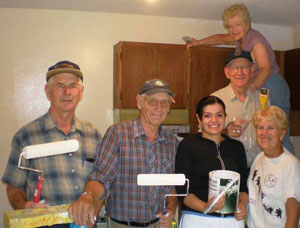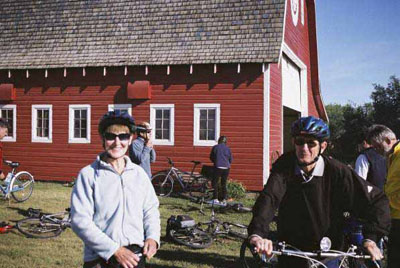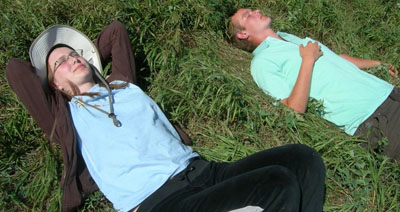Canadian Mennonite
Volume 12, No. 19
Sept. 29, 2008
Churches collaborate
Three Saskatchewan congregations combine to provide refugee relief for Colombian immigrants
Saskatoon, Sask.
 |
On Aug. 13, Saskatoon became home for six internally displaced Colombians who almost didn’t get the second chance they so desperately wanted.
The story began when Osler (Sask.) Mennonite Church was approached by Mennonite Central Committee (MCC). Two years before, the small-town congregation had welcomed a Colombian couple, Roberto and Amalia, into their midst. Now Roberto’s extended family also needed help to get out.
“We knew the cost was prohibitive,” Osler’s pastor, Gordon Allaby, acknowledges. The church council met to decide whether it would agree to this request or to consider a second ministry opportunity. An American war deserter and the needs of his family had come to the church’s attention and the congregation also wanted to support him. Council voted to stick with the local opportunity.
MCC came knocking a second time, however. Now the Canadian Embassy in Colombia was emphasizing that unless these refugee families could obtain private sponsorship opportunities, their arrival would be further delayed. Could Osler help?
“I thought we could maybe pay half,” says Jake Buhler, Osler’s Refugee Committee chair.
Zoar Mennonite in Langham, Sask., had also been contacted to see if there was any interest in helping the Colombians. At first, the response was slow in coming.
Elaine Harder from MCC called to say that it would cost more than $10,000 to keep the file open. Together, Buhler, and Gaylord Mierau from Zoar Mennonite, signed as sponsors for the refugees. It bought them much-needed time to plan the next steps.
“I felt shaky when I was signing,” Mierau admits. “It was a step of faith.”
His faith was rewarded. Four families from Zoar stepped forward and donated a total of $11,000, the amount needed to keep the file open. The church also agreed to support the concept and raise more money.
In the meantime, Buhler had approached First Mennonite Church in Saskatoon in June about sponsoring a refugee family together with Osler.
All three churches had some experience in welcoming refugees and together they settled on a one-year sponsorship of the immigrants.
“We weren’t expecting anything to happen until the fall,” says Buhler.
But suddenly things began moving quickly. The two families, a young couple and a family of four, weren’t expected until fall, but Immigration Canada decided to send them sooner.
Arnie Fehderau, pastor of First Mennonite, came back from summer holidays surprised to find that the refugees were on their way.
A joyous celebration followed at First Mennonite, where about 60 people—including representatives from the three sponsoring churches—joined together for a meal following the refugees’ arrival. Later, the larger Hispanic community gave glory to God for their arrival during an informal worship service at a nearby park.
“Learning English will be a top priority” for the new immigrants, says Fehderau, explaining that finding jobs for them can wait.
How ‘Green’ is my World?
Pilgrimage to a sacred place
Hague, Sask.
 |
“What does the Lord require of you?” from Micah 6 had been running around in my head. “What does the Lord require of you but to do justice, love kindness and walk humbly with your God?”
On Aug. 23, 21 bikers and walkers departed from Funk’s farm in Hague, embarking on a three-day adventure, known as the Green Trek, that would change the way that we look at, and think about, sustainability issues and our role in caring for God’s creation.
Stops at a dump, organic farms and market gardens—not to mention stepping into the centre of an earth balloon—strengthened our awareness of the impact, for good or ill, that we have on God’s creation.
At every place we visited, we planted a tree, a mark of passage for us modern-day pilgrims. Each evening after supper we gathered to hear about a practical application of what we had learned. On the first evening we heard from Kenton Lobe, who joined us on our long bike-ride from Hague to the Rosthern Youth Farm; he spoke about global warming and food production. Nettie Wiebe talked about letter-writing and Kevin Friesen reflected on the cost of clothing, the second night. On the final day, we were blessed by a concert from Kalissa Regier and Val Wiebe at Shekinah Retreat Centre.
And after each gruelling or easy (depending on your level of bike proficiency) journey to the next learning centre, we were strengthened in body by delicious food. As much as possible, we consumed only locally grown food, found within 100 miles of where we were. This meant, of course, that we ate very well—sour cherry and Saskatoon berry pies; locally grown and milled flour made into bread, pie crusts and vereniki (Mennonite perogies); green beans; bison jerky and locally grown and produced farmer’s sausage.
Green Trek was more than an adventure. It was a pilgrimage—an intentional journey to a sacred place, often with stops along the way at sacred shrines. During the three intense days of learning and biking/walking and riding horse-drawn carts, participants were blessed to have journeyed together to arrive at a holy place—a new place of understanding God’s creation.
Now when I’m asked, “What does the Lord require of you?” I can respond with a new understanding: “Why, I believe the Lord is calling me to seek justice for the earth and all that is in it [people, plants, animals, rocks and air]; to not only love, but act with kindness to, all of God’s creation; and to remind myself to be humble when I walk, bike or carpool, knowing that God is with me.”
Serving our Creator
Market gardener explains the spiritual significance of caring for creation
 |
Three days riding a bicycle through the countryside near the Saskatchewan River with a couple dozen companions thinking, talking, meditating, praying, playing, looking and listening on the theme of caring for creation.
One of our Green Trek activities was a visit to a market garden. We could hear the combines of nearby farmers harvesting huge fields of grain, but on the outskirts of Rosthern, Sask., was a farmer making his living on less than an acre of land, marketing his produce to neighbours and at the farmers market in Saskatoon. His most prized farm implement was a hoe, about 15 years old and just getting to the point where it would slide through the soil most effectively and smoothly.
For 40 years, Eric Yoder has been tending his garden, producing bountiful crops of healthy vegetables. He has been a diligent student of his vocation and has an extensive understanding of the soil and plants he works with.
Yoder expressed a deep sense of our calling to care for creation. He told us that the Hebrew word translated as “till,” “work” or “care for” in the Genesis creation story is the same word translated as “serve” in other places in the Bible. By caring for the earth, we are serving our Creator. It is honourable and humbling work.
Green Trek was a sacred experience and I am left with the affirmation that, as God’s people, we are called to maintain and promote healthy relationships with our Creator and with all of creation—the air, water, land, plants, animals and all people.
Taking up the challenge
Green Trekkers told their own individual environmental efforts are not enough
Green Trek presented a variety of challenges to the participants who chose to bike or hike around the Saskatchewan Valley. There were physical challenges of travelling 85 kilometres using human- or horse-power, and of sleeping in unfamiliar surroundings on hard floors and thin mats, listening to the snores of fellow trekkers surrounding us. But more to the point were the challenges to our comfortable lifestyle and assumptions.
One such challenge came from Nettie Wiebe, a Mennonite farmer, university professor and political activist, who presented us with a challenge that is hard to ignore and yet often uncomfortable to address.
Of all the pollution that is affecting the earth, she told us that only 15 percent is caused by individuals, while the rest is produced by corporations, companies and governments. Therefore, even if each of us were to become “pure” in our own lifestyle, making all the changes to reduce green house gases that we possibly could, the big picture would not change much!
We must act collectively to change the direction in which our country is moving. Together, we can influence decisions that affect the welfare of our country and our world.
One way to work at this is writing letters to governments and companies that need to change their ways. Wiebe told us to address issues specifically, ask for concrete changes and not to rant on in generalities. This requires research and knowledge, but will generate responses and can influence policy direction, she said.
Is our church being called to work together to care for our earth? How is your congregation taking up this challenge?
Renate Klassen is MC Saskatchewan’s moderator.